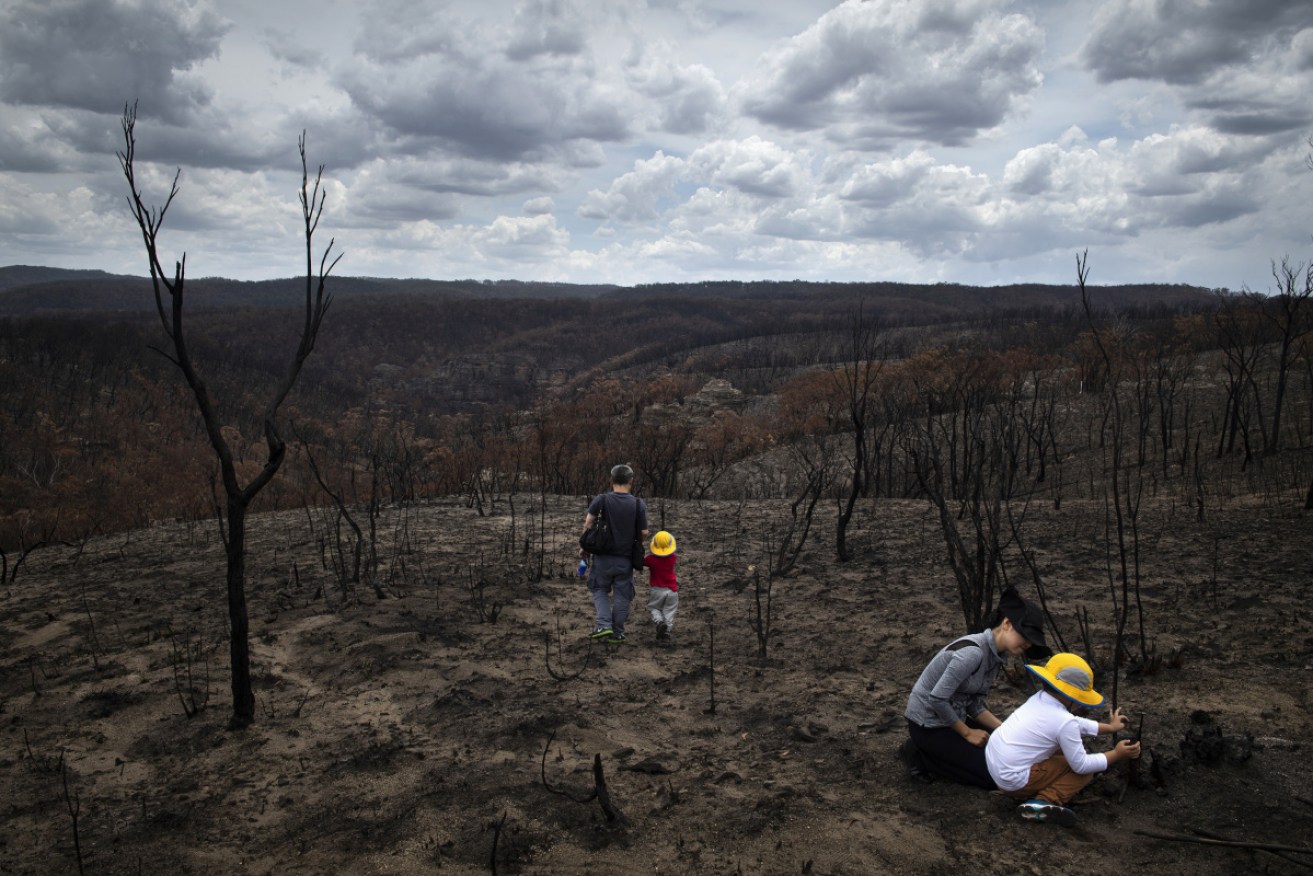Bushfires signal the end of Australia as we know it

A family inspects the remains of a bushfire in Bell, New South Wales. Photo: Matthew Abbott/ NYT
In a country where there has always been more space than people, where the land and wildlife are cherished like a Picasso, nature is closing in.
Fuelled by climate change and the world’s refusal to address it, the fires that have burned across Australia are not just destroying lives or turning forests as large as nations into ashen moonscapes.
They are also forcing Australians to imagine an entirely new way of life.
When summer is feared. When air filters hum in homes that are bunkers, with kids kept indoors.
When birdsong and the rustle of marsupials in the bush give way to an eerie, smoky silence.
“I am standing here a traveller from a new reality, a burning Australia,” Lynette Wallworth, an Australian filmmaker, told a crowd of international executives and politicians in Davos, Switzerland, last month.
“What was feared and what was warned is no longer in our future, a topic for debate – it is here.
“We have seen the unfolding wings of climate change.”
Like the fires, it’s a metaphor that lingers.
What many of us have witnessed this fire season does feel alive, like a monstrous gathering force threatening to devour what we hold most dear on a continent that will grow only hotter, drier and more flammable as global temperatures rise.
It’s also a hint of what may be coming to a town, city or country near you.

Burned bush on the outskirts of Bredbo in New South Wales. Photo: Matthew Abbott/ NYT
In a land usually associated with relaxed optimism, anxiety and trauma have taken hold.
A recent Australia Institute survey found that 57 per cent of Australians have been directly affected by the bushfires or their smoke.
With officials in New South Wales announcing on Thursday that heavy rain had helped them finally extinguish or control all the state’s fires that have raged this Australian summer, the country seems to be reflecting and wondering what comes next.
Politics have been a focal point – one of frustration for most Australians.
The conservative government is still playing down the role of climate change, despite polls showing public anger hitting feverish levels.
And yet what’s emerging alongside public protest may prove more potent.

Tourists in Lake Conjola take refuge on New Year’s Eve. Photo: Matthew Abbott/ NYT
In interviews all over the fire zone since September, it’s been clear that Australians are reconsidering far more than energy and emissions.
They are stumbling toward new ways of living: Housing, holiday travel, work, leisure, food and water are all being reconsidered.
“If there’s not a major shift that comes out of this, we’re doomed,” said Robyn Eckersley, a political scientist at the University of Melbourne who has written extensively about environmental policy around the world.
“It does change everything – or it should.”
Professor Eckersley is one of many for whom climate change has shifted from the distant and theoretical to the personal and emotional.
Before the fires peaked last month, she and I had often spoken in dry terms about Australia and climate change policy.
This last time, as she sat in a holiday home south-west of Melbourne, where smoky haze closed a nearby beach, she told me about a friend driving south from Brisbane, “by all these towns and farms he couldn’t imagine bouncing back”.
Australia, she argued, must accept that the most inhabited parts of the country can no longer be trusted to stay temperate – and, she added, “that means massive changes in what we do and the rhythm of our work and play”.
More specifically, she said, the economy needs to change, not just moving away from fossil fuels, a major export, but also from thirsty crops like rice and cotton.
Building regulations will probably stiffen too, she said.
Already, there are signs of growing interest in designs that offer protections from bushfires, and regulators are looking at whether commercial properties need to be made more fireproof as well.
The biggest shifts, however, may not be structural so much as cultural.
Climate change threatens heavy pillars of Australian identity: A life lived outdoors, an active international role and an emphasis on egalitarianism that, according to some historians, is rooted in Australia’s settlement by convicts.
Since the fires started, tens of millions of hectares have been incinerated in areas that are deeply connected to the national psyche.
If you’re American, imagine Cape Cod, Michigan’s Upper Peninsula, the Sierra Nevada and California’s Pacific Coast, all rolled into one – and burned.
The fear of ferocious nature can be tough to shake.
Fires are still burning south and west of New South Wales, and to many, the recent rain near Sydney felt as biblical as the infernos the storms put out – some areas got more than 60 centimetres, flooding rivers and parched earth hardened by years of drought.
Last month in Cobargo, a dairy and horse town six hours’ drive from Sydney, I stood silently waiting for the start of an outdoor funeral for a father and son who had died in the fires a few weeks earlier.
When the wind kicked up, everyone near me snapped their heads toward where a fire burned less than two kilometres away.
“It just hasn’t stopped,” said an older man in a cowboy hat.
David Bowman, a climate scientist in Tasmania who wrote an article calling for the end of the summer school holiday, which went viral, said Australia’s experience could help the world understand just how much climate change can reorder the way we live.
“You can’t pretend that this is sustainable,” he said.
“If that’s true, you’re going to have to do something different.”
Smoke may be more of a catalyst than flame.
For much of the summer, a fog of soot has smothered Sydney, Melbourne and Canberra.
In Sydney alone, there were 81 days of hazardous, very poor or poor air quality last year, more than in the previous 10 years combined.
And until the recent rains, the smell of smoke often returned.
Mike Cannon-Brookes, Australia’s most famous tech billionaire, called it part of a broader awakening.
“It’s bringing home the viscerality of what science and scientists have been telling us is going to happen,” he said.
Mr Cannon-Brookes said Australia could seize the moment and become a leader in climate innovation.
Ms Wallworth, the filmmaker, echoed that sentiment: What if the country’s leaders did not run from the problem of climate change but instead harnessed the country’s desire to act?
“If only our leaders would call on us and say, ‘Look, this is a turning point moment for us; the natural world in Australia, that’s our cathedral, and it’s burning – our land and the animals we love are being killed’,” she said.
“If they called on us to make radical change, the nation would do it.”
–New York Times








